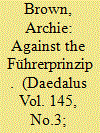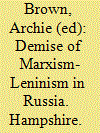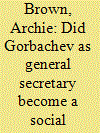| Srl | Item |
| 1 |
ID:
146253


|
|
|
|
|
| Summary/Abstract |
The Führerprinzip has not been confined to Nazi Germany. The cult of the strong leader thrives in many authoritarian regimes and has its echoes even in contemporary democracies. The belief that the more power a president or prime minister wields the more we should be impressed by that politician is a dangerous fallacy. In authoritarian regimes, a more collective leadership is a lesser evil than personal dictatorship. In countries moving from authoritarian rule to democracy, collegial, inclusive, and collective leadership is more conducive to successful transition than great concentration of power in the hands of one individual at the top of the hierarchy. Democracies also benefit from a government led by a team in which there is no obsequiousness or hesitation in contradicting the top leader. Wise decisions are less likely to be forthcoming when one person can predetermine the outcome of a meeting or foreclose the discussion by pulling rank.
|
|
|
|
|
|
|
|
|
|
|
|
|
|
|
|
| 2 |
ID:
035488


|
|
|
|
|
| Publication |
Cambridge, Cambridge University Press, 1982.
|
| Description |
492p.: maps.Pbk
|
| Standard Number |
0521231698
|
|
|
|
|
|
|
|
|
|
|
|
Copies: C:1/I:0,R:0,Q:0
Circulation
| Accession# | Call# | Current Location | Status | Policy | Location |
| 021096 | 947.03/BRO 021096 | Main | On Shelf | General | |
|
|
|
|
| 3 |
ID:
054105


|
|
|
|
|
| Publication |
Hampshire, Palgrave Macmillan, 2004.
|
| Description |
xvi, 233p.
|
| Series |
St. Antony's series
|
| Standard Number |
0333651243
|
|
|
|
|
|
|
|
|
|
|
|
Copies: C:1/I:0,R:0,Q:0
Circulation
| Accession# | Call# | Current Location | Status | Policy | Location |
| 048675 | 320.94709049/BRO 048675 | Main | On Shelf | General | |
|
|
|
|
| 4 |
ID:
118433


|
|
|
|
|
| Publication |
2013.
|
| Summary/Abstract |
As General Secretary, Gorbachev evolved from a Communist reformer to a socialist of the social democratic type. The most important programmatic documents of the CPSU in 1990-1991, on which Gorbachev had the predominant influence, were essentially social democratic. (Many in the Party apparatus had no intention of implementing them.) From 1988, Gorbachev was advocating fundamental change of the Soviet system, although there were zig-zags in his public pronouncements under the pressure of events. Ill-understood both at home and abroad, Gorbachev's social democratic ideas were 'outflanked' by the market fundamentalism and political impatience of his radical opponents and frustrated by the implacable enmity of conservative defenders of the vanishing Communist party-state.
|
|
|
|
|
|
|
|
|
|
|
|
|
|
|
|